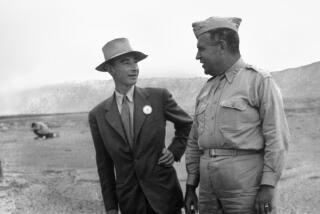A man of gravitas
- Share via
FOLLOWING Plutarch and John Aubrey, Peter Ackroyd has embarked on a 10-book series titled “Ackroyd’s Brief Lives,” of which “Newton” is the third, after “Chaucer” and “Turner.” A prolific novelist as well as a biographer, Ackroyd has been called -- by academics -- a practitioner of “British historiographic metafiction.” Ordinary folks prize his novels (“Hawksmoor,” “Chatterton,” “The Lambs of London”) for bringing their subjects to life in the context, and sometimes the language, of their times. Likewise, his biographies tend toward the novelistic (“I just think of them as other novels,” he told fellow novelist Patrick McGrath). That’s not to say he makes things up. “Newton” is both impeccably researched and a wonderful read. An afternoon in the backyard hammock with “the grand autocrat of science.”
Isaac Newton is known to children (and a few adults) as the man who discovered gravity after an apple fell on his head. To many more of us, he is known for having set the world on its feet by formulating three laws of motion that still hold and have enabled us to visit the rest of the solar system some 300 years after he devised them. With regard to the apple-generated epiphany -- let’s get that out of the way right now -- this “pious misunderstanding” was instigated by Newton himself, in “four separate versions,” Ackroyd writes, “for the simple reason that Newton recounted different versions to four separate people.” But “it did not happen like that.” Between the time Newton reclined in the orchard and the time he managed to establish the universality of gravity (he did not discover it; the idea had been around for a while) “much labour of thought and of calculation” had intervened.
He was also a not very endearing eccentric -- “isolated and secretive, unwilling to share his knowledge, ever vulnerable and suspicious.” His gnarly disposition may have been rooted in early unhappiness. Newton’s father died before he was born; his mother remarried, leaving him to be raised in rural isolation by his maternal grandmother. “It is often said that brilliant mathematicians tend to have solitary childhoods,” Ackroyd writes, “in which they can explore the visionary world of numbers.”
Maybe. What’s indisputable is that his career was marked by bitter professional battles: with chemist Robert Hooke, astronomer John Flamsteed and, famously, Gottfried Leibniz -- in this case, over which one should be considered the father of differential calculus. Ackroyd concludes that “both men had formulated approximately the same method independently, in one of those acts of simultaneous genius that are relatively common in the history of science.” Leibniz, inventor of the “more accessible and comprehensible version,” agreed to let London’s Royal Society, of which Newton was president, decide the question. Newton chose the jury and wrote up “in his own handwriting” the unanimous report in his favor.
Newton may have been inaccessible, even deliberately so -- his masterwork, the “Philosophiae Naturalis Principia Mathematica,” written in Latin, is said to be hard to understand even in English -- but the laws themselves are clear as glass. And like many scientific geniuses, he was remarkably prescient. He thought light was made up of “corpuscles”; one of his fights with Hooke presaged the early 20th century argument about whether light consists of waves or particles (both, it turns out, and simultaneously). He suggested that therefore, “Bodies act upon Light at a distance; and by their action bend its Rays,” a notion nailed down by Albert Einstein two centuries later. He speculated about a grand unified theory (in 1706!), in which “the Attractions of Gravity, Magnetism and Electricity” are related. This was partly accomplished in another 100 years; we’re still trying to accommodate gravity.
He often ate standing up. He often slept in his clothes. He did not often laugh, apparently: There’s a recorded instance of his laughing “when he was asked what was the use of studying Euclid” (a thigh-slapper of which Ackroyd notes, “The exact meaning . . . is not at all clear”). Whoever laughed or attempted a joke at the Royal Society meetings that Newton presided over “was asked to leave the room.” A contemporary reports that when Newton rode in his coach through the streets of London, “one arm would be out of the Coach on one side, and the other on the other.” He decorated his house in red: “a ‘crimson mohair bed’ with ‘case curtains of crimson,’ crimson drapes and crimson wall hangings, a crimson settee with crimson chairs and crimson cushions.” Shades of David Lynch.
William Blake and the Romantic poets excoriated Newton as “the enemy of the imagination,” but Alexander Pope, poet of the Age of Reason, celebrated him:
Nature and Nature’s laws lay hid in night;
God said, Let Newton be! And all was Light.
Newton returned the divine favor. A nominal Protestant, he firmly believed in God -- though not in the Trinity. “There was for him no necessary disjunction between science and theology,” Ackroyd writes. “They were part of the same pursuit. Theology and science were, equally, avenues to God. . . . He was a philosopher in the ancient sense, a seeker after wisdom.” On his deathbed, which was an awful one (kidney stones), he did not complain.
--
More to Read
Sign up for our Book Club newsletter
Get the latest news, events and more from the Los Angeles Times Book Club, and help us get L.A. reading and talking.
You may occasionally receive promotional content from the Los Angeles Times.










